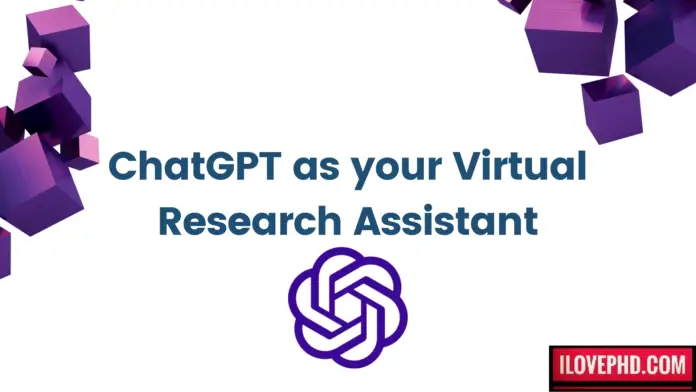In the era of rapid information expansion, researchers are constantly seeking efficient tools to streamline their work and enhance productivity. Enter ChatGPT, a revolutionary language model developed by OpenAI, can serve as your virtual research assistant, aiding in information retrieval, idea generation, and much more. The potential of ChatGPT to be used as a virtual research assistant is discussed in this article.
Maximizing Research Efficiency: A Guide to Harnessing ChatGPT as Your Virtual Assistant
1. Understanding ChatGPT
ChatGPT is based on the GPT-3.5 architecture, designed to understand and generate human-like text. It has been trained on diverse datasets, making it adept at comprehending and responding to various queries. To use ChatGPT effectively, start by formulating clear and concise questions.
2. Effective Query Formulation
Crafting well-defined questions is key to obtaining precise and relevant information. Break down your research queries into simple sentences to ensure ChatGPT understands your intent accurately. For instance, instead of asking, “Tell me about artificial intelligence,” consider asking, “What are the current applications of artificial intelligence in healthcare?”
3. Refinement through Iteration
ChatGPT’s responses can be refined through an iterative process. If the initial answer is broad or not exactly what you’re looking for, provide feedback and ask for clarification. By narrowing down your request based on the model’s responses, you can gradually obtain more tailored information.
4. Citing Sources and Fact-Checking:
While ChatGPT can assist in gathering information, it’s crucial to verify facts and cite reliable sources independently. Use ChatGPT as a complementary tool for idea generation and initial research, but always cross-reference its responses with trusted academic papers, articles, and databases.
5. Generating Ideas and Outlining Research
Beyond information retrieval, ChatGPT is excellent for brainstorming and outlining research projects. Describe your research focus and ask for suggestions on subtopics, methodologies, or key points to include. The model can provide valuable insights to kickstart your creative process.
6. Learning from Previous Interactions
ChatGPT retains context from the conversation, allowing you to build on prior interactions. Referencing earlier questions and responses ensures a coherent flow of information and helps ChatGPT understand your research context more effectively.
7. Enhanced Productivity with Shortcuts
Optimize your workflow by using time-saving shortcuts. Instead of typing out long sentences, experiment with more concise queries. ChatGPT is responsive to brief and well-structured prompts, enabling faster interactions and increasing your overall efficiency.
8. Privacy and Data Security
While ChatGPT is a powerful tool, be mindful of sensitive information. Avoid sharing confidential data during interactions and prioritize the confidentiality of your research. Use ChatGPT as a supplement to your research process without compromising privacy.
Incorporating ChatGPT into your research toolkit can elevate your capabilities as a super researcher. By mastering effective query formulation, refining responses through iteration, and leveraging ChatGPT‘s creative potential, you can navigate the vast landscape of information with precision. Remember, while ChatGPT is a valuable asset, it works best in tandem with traditional research methods. Embrace the power of AI as you embark on your research journey and unlock new dimensions of knowledge.


